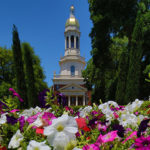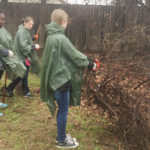NASHVILLE, Tenn. (ABP)—Growing up in a Baptist church and later working part-time as a youth minister, Johnny Sears always believed his faith had to go deeper than a set of beliefs or activities.
“How do we take prayer from being another thing on the to-do list and make it a way of life?” Sears pondered in an interview. “That’s really in my mind what it’s all about, and it all flows from that.”
|
Johnny Sears
|
Attending classes part-time at Baptist Seminary of Kentucky, Sears learned about contemplative spirituality practiced by individuals like Thomas Merton, a Trappist monk in Kentucky who wrote 70 books before his death by an electrocution accident in 1968 at age 53.
Interest in the subject led Sears to withdraw from seminary to enroll in the Academy for Spiritual Formation, a two-year covenant-learning environment combining academic training and experience in spiritual disciplines offered by Upper Room Min-istries. In July, he took over as the academy’s director.
Started 27 years ago, the academy is part of Upper Room, an ecumenical division of the United Methodist Church’s General Board of Discipleship founded in 1935. He admits a 35-year-old Baptist layman with an engineering degree and no plans to enter full-time ministry might not seem a logical choice.
On the other hand, “the Baptists that I’ve seen and talked to that go through it, we all just kind of get into it and have this epiphany,” he quickly added. “We just fall in love with it.”
The academy enrolls a community of about 50 people plus faculty who go through the program together. Over the course of two years, they are offered a total of 16 courses and meet in a retreat setting for five days four times a year.
Sears, who fully intended to re-enter seminary but during his two-year hiatus decided he no longer desired a ministry degree, said the commitment in some way mirrors the seminary experience. It’s a huge obligation of both time and money, for example, and both aim for an outcome of spiritual transformation.
On the other hand, Sears said, he found the approach more holistic than seminary, which while incorporating both head and heart, still tilts more toward the intellectual side.
Sign up for our weekly edition and get all our headlines in your inbox on Thursdays
“You have the experiential, you have the intellectual, you have the social and you even have the institutional piece of it, too,” he said. It’s what his former professor Glenn Hinson called the “four-legged stool” for balanced spirituality.
One of the gifts of the academy, Sears said, is the sense of community that develops.
“It will be such an odd mix of people each time,” he said. “People come from all walks of life. The academy is typically a mixture of lay and clergy.”
“It tends to skew a little older,” he added. “I’m trying to work on that and get younger people in, but that time and money commitment is difficult. Lots of times it’s not until you’re in those later stages of life that you really can manage to do this.”
That community gets broken up into smaller groups of seven or eight who get together every night for every session for about an hour and a half.
“It’s not just a discussion group,” he said. “It’s a time to be with one another and to journey together and share lives. It’s sort of a group spiritual direction in a sense. … Over the course of two years, that can become very intimate.”
On top of that is a “daily rhythm” of the eight sessions.
“You start each day in worship and morning prayer,” he said. “You have Eucharist every day. You close with night prayer. So the day is framed in prayer and worship. You have times of silence, extended periods of silence, during the day. You have the academic aspect of it, but all of those things work together.”
Sears said the academy isn’t some sort of “fringe group” promoting a New Age spirituality that says, “I’m spiritual, but I’m not religious.” It’s highly ecumenical, he said, but it works within the institutional church as an extension instead of replacing it.
Sears said he thinks one reason Baptist participants find the academy so rewarding is the way they worship often doesn’t include as much of the contemplative side, and they traditionally are so action-oriented they can lose connection to the “deeper well” of spirituality.
“That’s not to say that we’re just navel gazing and we’re going to sit around a pray while the world goes to hell,” he said. “I genuinely think that if you have that deep connection to God that you can’t avoid being thrust into the social issues of the day.
“We tend to fall off on one side or the other as a totally individualistic me-and-Jesus sort of experience, or we emphasize the social activism kind of aspect. The problem with that is getting burned out, and you’re trying to do it all on your own. You become bitter and angry and all those kinds of things. Really, that activism has to come from this place of being rooted in Spirit, and then it’s out-flowing that.
“We’re not the ones that are really driving this bus,” he continued. “I’m not going to do this on my own. This needs to come from some place transcendent, and I need to be attuned to that. That is the only way that my ministry is really going to have an impact.”
One thing the Baptist tradition brings to the table, Sears said, is the “voluntary principle” of religion.
“We’re not going to be coerced,” he said. “That is something that is needed, not an obstinate independence, but an ability to challenge the status quo and not be coerced into a certain pattern and certain way.”














We seek to connect God’s story and God’s people around the world. To learn more about God’s story, click here.
Send comments and feedback to Eric Black, our editor. For comments to be published, please specify “letter to the editor.” Maximum length for publication is 300 words.